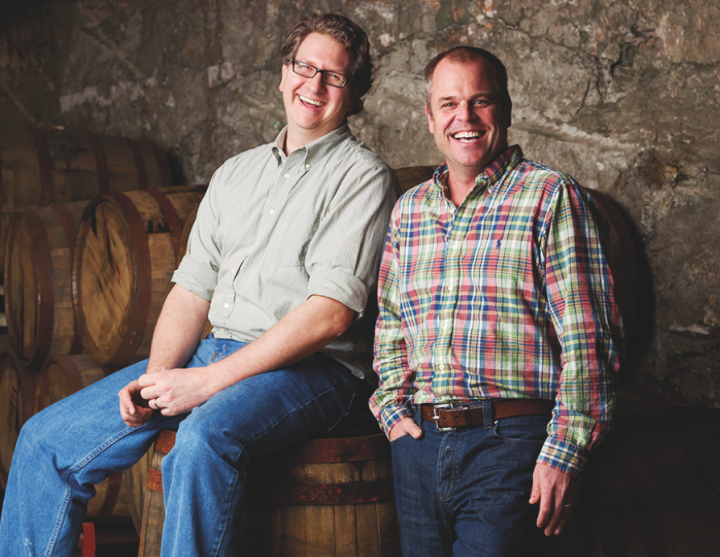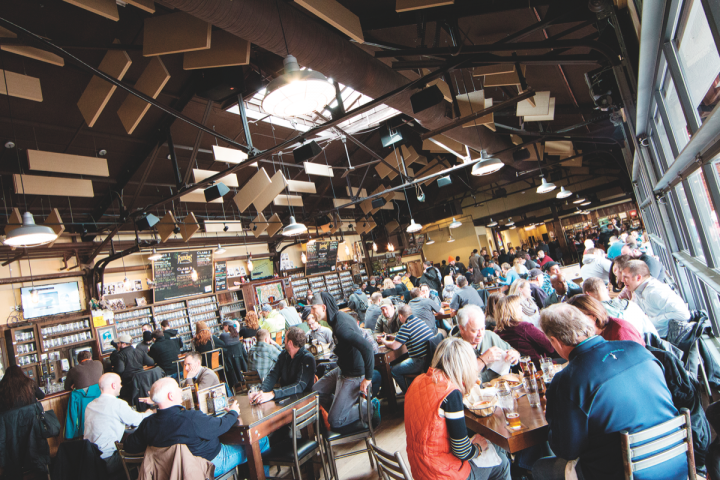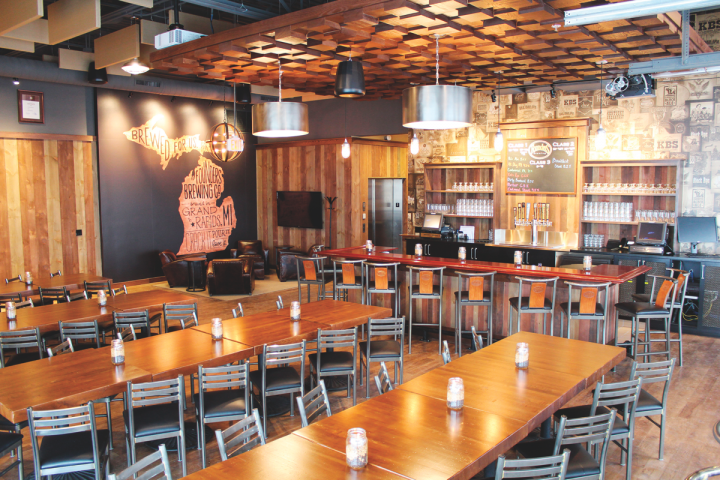
Fifteen years ago, Grand Rapids, Michigan–based Founders Brewing Co. was on the brink of bankruptcy. At the time, cofounders Mike Stevens and Dave Engbers did some soul searching and realized that attaining their dream of successfully running a craft brewery would require taking a big chance while remaining true to their original vision. That refocusing and dedication has paid off, and Founders has re-emerged to become one of the largest and fastest-growing craft breweries in the country.
Engbers concedes that when Founders first started selling beer in 1997, its brews were “fairly mainstream and unremarkable.” Stevens recalls the company’s initial goals. “We wanted to make some of the world’s greatest beers—labels that excited us and differentiated us,” he says. “But for the first few years, we weren’t doing that.” So in 2000, with the introduction of Dirty Bastard Scotch ale, Founders adopted the motto “Brewed for Us,” and the craft beer community responded. The brewery still stands by that mission today.
According to the Brewers Association, Founders posted the best growth performance of the top 30 craft breweries in 2014. Volume for the company, now ranked as the nation’s 17th-largest craft brewer, surged 74 percent last year to 193,000 barrels. The company declines to report its sales revenues, but Stevens projects volume of about 270,000 barrels this year, with continued growth expected in 2016. Employing about 300 workers, Founders distributes its beer in 38 states and Washington, D.C. Engbers reports that the brewery’s largest markets include Michigan, Ohio, New York and Chicago. While the company has recently expanded into states like North Dakota, South Dakota, Nevada and California, Stevens notes that Founders’ brews are still growing at healthy rates in its core markets.

Focused Mission
Stevens and Engbers met in college and bonded over a mutual fondness for beer and home brewing. “Everyone told us that when we graduated, we should do what we love,” says Engbers, who serves as Founders’ president. “We saw that there was a brewery in Kalamazoo, Michigan, and decided that we should open one in Grand Rapids.” Stevens, whose title is CEO, agrees. “We were just trying to do something that we loved, and if it could result in a career, even better,” he adds. But it proved to be a long, hard slog. “We had 15 years of hardship and didn’t break even until seven years ago,” Stevens says. In hindsight, he notes that those difficult years allowed him and Engbers to “cut our teeth and understand the business.” Founders outgrew its original site and relocated to Grandville Avenue in 2007. The larger facility allowed the company to produce enough beer to satisfy a growing cadre of fans.
Last year, the duo decided that in order for Founders to expand on a larger scale and to ensure that the company becomes a multigenerational brewery, another partner would be necessary. In December, Founders announced an agreement with Spanish brewer Mahou San Miguel, under which the Madrid-based company acquired a 30-percent stake in Founders, with Stevens and Engbers retaining the remaining 70 percent. “We still make all of the decisions,” Stevens says. The partnership resulted in many synergies, including the ability for Founders to expand distribution in the United States and bring the brand to a global audience, as well as provide liquidity to early investors. Engbers notes that Founders can benefit from Mahou San Miguel’s distribution throughout Europe, Asia and Africa and its overseas production facilities. The Spanish company, meanwhile, is getting an inside look at the U.S. craft beer business.

Diverse Lineup
Founders produces five year-round brews available packaged and on draft and three year-round labels that are draft only, along with a variety of seasonals, specialties and limited-release beers. All Day IPA, a sessionable 4.7-percent alcohol-by-volume (abv) brew that launched three years ago, has quickly emerged as the top-selling beer, accounting for about half of the company’s volume. “All Day was really a different direction for Founders because we had built a reputation on beers that were 7-percent to 12-percent abv,” Engbers says. “But we saw a need for a full-flavored, lower-alcohol beer.” The company doesn’t expect the offering to slow down anytime soon. “We’ve really yet to scratch the surface with All Day,” Stevens adds.
Centennial IPA and Dirty Bastard are Founders’ second- and third-largest labels. While year-round beers are important to the company, Engbers notes that consumers like change and innovation. As a result, Founders is known for its array of seasonal, specialty and limited brews, including the coveted small-production KBS (Kentucky breakfast stout), which is cave-aged in oak Bourbon barrels for a year and released every spring. The Backstage Series, meanwhile, features limited-edition experimental beers that are produced sporadically throughout the year and packaged in 750-ml. bottles. “We’re a product-driven company and we take the quality of our beers seriously,” Engbers says, pointing to reviews that rate Founders brews with scores of 98, 99 and 100.

Engbers says the company’s off-premise sales comprise about 65 percent of its overall volume and on-premise sales contribute 35 percent. While Stevens says that the majority of the company’s sales currently come from independent stores, he and his partner expect the retail mix to change in the near future.
“Ten years ago, craft beer didn’t have much of a presence in the grocery channel,” Stevens says. “Today, you’re seeing more consumers pick up craft beer when they’re shopping at the grocery store.” Engbers adds that Founders lags larger breweries when it comes to sales via chain stores. “There’s no question that chains are our future,” he says, noting that the company has recently expanded its chain sales force.

Growth Plan
Over the summer, Founders completed the first phase of a $40 million brewery expansion, increasing its annual capacity to about 600,000 barrels. A second phase of the project is due to launch in the fourth quarter, ultimately bringing capacity up to 900,000 barrels and providing additional space for fermentation, kegging, canning and bottling. The expansion will enable the Michigan brewery to add distribution in more western states.
Expanded availability will also be a boon to allocated labels like KBS. “Every year it seems we’re nearly doubling the volume of that brand,” says Engbers, noting that release events for KBS are growing in popularity. “As we expand our distribution footprint, more craft beer enthusiasts will be able to get involved in the fun release parties.”
Founders’ marketing focuses on consumer events with an eye toward educating them about beer styles and pairing beer with food. “With beer dinners, our staff and distributors can have actual conversations with beer consumers and educate them about our products,” Engbers says. “These events give consumers the chance to compare a barrel-aged beer with a Scotch ale or IPA.” The company also participates in beer festivals, but Engbers cautions that the emphasis in those venues isn’t always on consumer education. “It’s almost irresponsible of our industry to continue to foster these festivals that end with people drinking too much,” he explains. “I really question how much brand building they do.”

Engbers says Founders’ taproom has become the brewery’s de facto source for focus-group research. With 725 seats, the venue serves up exclusive and experimental brews, allowing guests to provide direct feedback to brewmasters on the selections offered. Additional marketing support includes social media via sites like Twitter, Facebook and Pinterest.
Stevens is bullish that craft beer will continue to grow in the United States. “I see craft comprising 20 percent of the beer market in five years and 30 percent thereafter,” he says. But the company founders emphasize that craft brewers must remain committed to quality products. “There’s great beer being brewed, but there’s also a lot of subpar beer out there as well,” Engbers notes. “Bar owners, restaurateurs and retailers have a responsibility to serve and sell quality products. We should encourage all craft breweries to take their businesses seriously.”
Engbers and Stevens believe that craft beer has a bright future not just in the United States, but internationally. Founders’ partnership with Mahou San Miguel will allow the Michigan brewery to capitalize on that opportunity in markets stretching from Europe to Asia to Australia. “For us, it’s an honor to know we might be one of the companies that pioneers the American craft beer movement on a global level,” Stevens says.